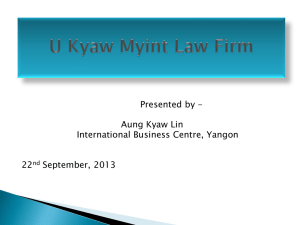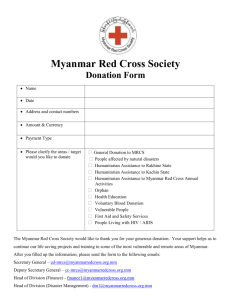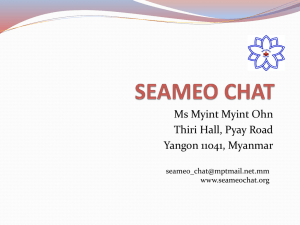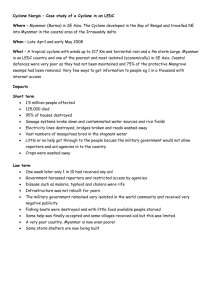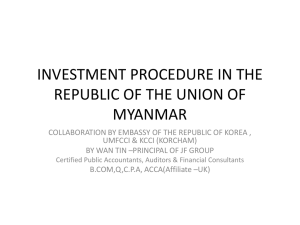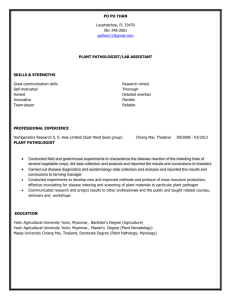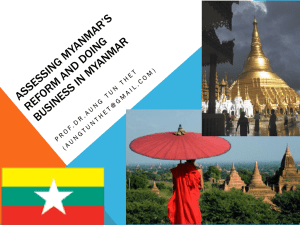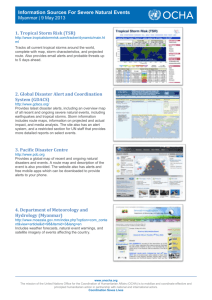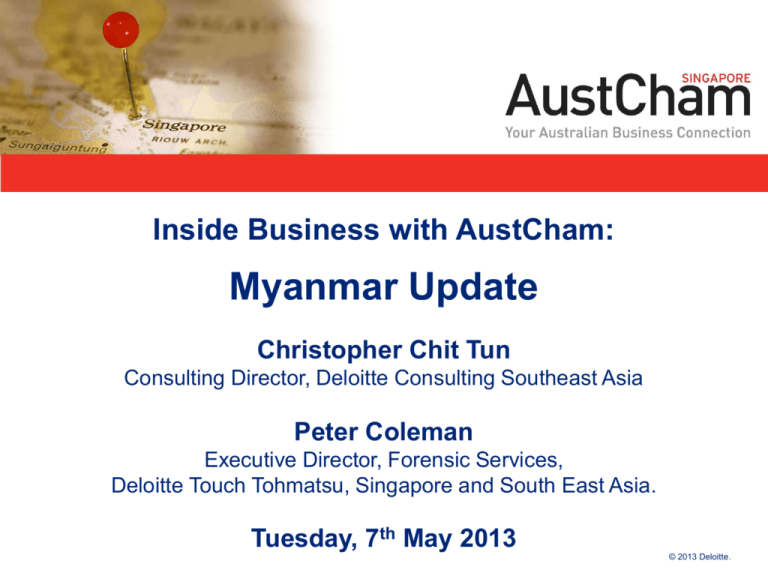
Inside Business with AustCham:
Myanmar Update
Christopher Chit Tun
Consulting Director, Deloitte Consulting Southeast Asia
Peter Coleman
Executive Director, Forensic Services,
Deloitte Touch Tohmatsu, Singapore and South East Asia.
Tuesday, 7th May 2013
© 2013 Deloitte.
Your partner in discovering the last frontier.
1
© 2013 Deloitte.
Headlines
Myanmar has emerged as a country undergoing most rapid changes in the world. Since U Thein Sein
was sworn in as the country‘s new president in 2011, Myanmar has embarked on a series of socioeconomic reforms including enacting laws reviewed by international standards, opening decades-longclosed market to the world, and relieving sanctions which has inhibited the growth of the economy
As the western world looks east to be the engine of global growth, Myanmar with its abundant natural
resources and untapped markets, thus surfaces as the most attractive ground for businesses to venture.
However, the lack of basic infrastructure (electricity, water supply, office space, etc.,), legal infrastructure
(commercial laws, regulations, tax and financial systems, etc.,), and other insufficiencies have become
obstacles for businesses to operate in Myanmar.
2
© 2013 Deloitte.
Why Myanmar
3
© 2013 Deloitte.
Myanmar at a Glance
Myanmar is strategically located between China and India, which holds more than a
third of the global population
Major Cities
China
•
•
Naypyidaw
New capital of Myanmar
(since March 2006) and
third largest city
HQ of government
ofiices officials
India
Bangladesh
Gazetted Special Economic
Zone (SEZ)/Deep Sea Port
1)
Kyaukphyu in Rakhine
State
2)
Thilawa in Yangon Division
3)
Dawei in Tanintharyi
Division
Six Free Trade Zones
•
•
Yangon
Former capital and
largest city
Most important
commercial center with
best education and
healthcare facilities
MANDALAY
6
5
1
NAYPYITAW
Laos
BAY OF
BENGAL
6)
YANGON
1
•
•
•
Mandalay
Last royal capital and
second largest city
Economic and
commercial hub of upper
Myanmar
30% of city population
are Chinese immigrants
2
Source: IE Insight, Peopledaily.com
4
2
3
Thailand
ANDAMAN
SEA
Gazetted Special Economic Zone
3 Dawei
International Airport
Thilawa in Yangon
Mawlamyine in Mon State
Myawaddy in Kayin State
Hpa-an in Kayin State
Kyaukphyu in Rakhine
State
Pyin Oo Lwin in Mandalay
Division
Five prospective sectors
for SEZ and free trade zones
i.
ii.
iii.
iv.
Free Trade Regions
Deep Sea Port
4
1)
2)
3)
4)
5)
v.
production
high-tech
agriculture, livestock
breeding and forestry
transport and
communications
banking services
© 2013 Deloitte.
Myanmar in Transition
Myanmar has taken great strides politically and economically since Thein Sein
assumed the President of Myanmar in 2011
Events
2011
Mar Mr. Thein Sein became the President,
SPDC dissolved.
Aug Deregulated export tax
Sep Ceased building Myitsone dam
Oct Approved private banks for the transaction of
Oct Myanmar got assigned as ASEAN chair in 2014
Nov Hillary Clinton visited Myanmar
Jan Agreed on cease fire with Karen
Apr NLD, led by Aung San Suu Kyi won the by-election
EU lifted the economic sanction
2012
JP Govt exempted 3 00 Billion JPY debt on
Myanmar
Nov Revised labor union law
Mar Raised the wage of public officer
Apr Unified the multi exchange rate
May Deregulated the automotive import
Sept Opened the insurance to private
Nov Released New Foreign Investment Law
Sep Reshuffled the Cabinet
Dec Signed MOU about Thilawa SEZ
development
Nov US President Obama visited Myanmar
Jan JP Govt. announced the restart of ODA
Exempt from 6 billion USD debt
Feb Started negotiation on investment treaty with EU
2014
foreign currency
May US relieved the economic sanction
President Thein Sein attended the UN conference.
2013
Policy Changes
with Japan
Jan Released New Foreign Investment Laws
SEZ Law / Condominium Law to be
announced
Myanmar to be assigned as Chair of ASEAN
General Election
2015
ASEAN Economic Community
© 2013 Deloitte.
5
Source:
Myanmar in Focus
Geographic summary and economic indicators
Economic indicators (2012 estimate)
Geographic Summary
Name
• The Republic of the Union of Myanmar
GDP
US$54 billion
GDP Growth
6.3%
Inflation (Average)
5.8%
Area
• 676,578 sq km (Land: 96.6%, Water:
3.4%)
Foreign Direct Investment
Land use
• Arable land : 14.9%, Permanent crops :
1.3%, Other : 83.8%
US$20 billion (pledged,
2010 - 2011)
Exports
US$8.529 billion
Land
boundary
• China : 2,185 km, Thailand : 1,800 km,
India : 1,463 km, Laos : 235 km,
Bangladesh : 193 km
Climate
• Tropical Monsoon
Current Account Balance
-4.4% of GDP
• Petroleum, natural gas, timber, minerals,
precious gems
Population
63 millions
Natural
Resources
Urban Population
33.2%
Unemployment
4%
Central Bank Discount Rate
10%
Commercial Lending Rate
13%
Gini Index
40*
Fiscal Deficit
5.7% of GDP*
Public Debt
45% of GDP*
* 2011 estimate
•
•
•
Strategically located between China and India as well as near major Indian Ocean shipping lines
Possesses abundant natural resources
With 65% of its population below 35 years of age (15 – 19 year olds being the largest segment, and 20 – 25 year olds close behind),
Myanmar is equipped with labor resources
6
Source: IMF 2012 Estimates, CIA, US Census, Deloitte Analysis, ADB
© 2013 Deloitte.
Myanmar‟s Export Earnings by Sector
Exports are largely based on raw materials/ primary industry, leaving much room for
improvement in the secondary and tertiary industries
Others
12%
Natural Gas
Forestry Products
29%
7%
Garment
4%
Fishery Products 4%
Raw Rubber 3%
Agricultural Products
3%
2%
Rice
10%
Beans and Pulses
26%
Minerals
7
Source: Ministry of Commerce 2012
© 2013 Deloitte.
Foreign Direct Investments in Myanmar
Over 80% of FDI is concentrated in power and oil & gas sectors since the first foreign
investment legislation was passed in 1988
Foreign investment of permitted enterprises as of 29/2/2012
Sectors
Power
Approved Amount
($USD million)
%
5
$18,873.720
46.48%
104
$13,815.375
34.17%
64
$2,794.463
6.91%
164
$1,760.701
4.35%
Hotel and tourism
45
$1,064.811
2.63%
Real estate
19
$1,056.453
2.61%
Livestock and fisheries
25
$324.358
0.80%
Transport and communication
16
$313.906
0.78%
Industrial estate
3
$193.113
0.48%
Agriculture
7
$173.101
0.43%
Construction
2
$37.767
0.09%
Other services
6
$23.686
0.06%
460
$40431.454
100%
Oil and gas
Mining
Manufacturing
Total
8
No.
Myanmar Investment Commission
A combination of the
lucrative nature of the
power and oil & gas
sectors and Myanmar‘s
resource abundance and
technical needs in such
sectors has caused the
high concentration of FDI
in these sectors.
As a frontier market with poor
inf rastructur e and newl y
opened
undiversified
e c o n o m y, My a n m a r h a s
taken initiatives to adopt
proper incentives and
promotional strategies to
increase the flow of
appropriate FDI needed to
integrate Myanmar‘s
economy with those of the
globalized nations.
© 2013 Deloitte.
Doing Business in Myanmar
9
© 2013 Deloitte.
Establishing a Business in Myanmar
The process of getting businesses approved in Myanmar can be complicated and time
intensive
1
Identify Intended
Business
Activity
Type of
business
activity to
undertake (e.g.,
manufacturing,
consulting,
construction, etc.)
2
Identify Relevant
Ministries/
Stakeholders
3
E.g., a large scale
manufacturing
project‘s relevant
agencies would
be Ministry of
Commerce,
Ministry of
National
Planning and
Economic
Development,
and Ministry of
the President‟s
Office.
Gaining appropriate advocacy to relevant
agencies/ bodies is necessary to ensure a smooth
process.
Timeframe
10
Contact Relevant
Ministries/
Authorities
4
Determine the
entity type to be
established
Contact relevant
ministries/
authorities to
establish good
relationships
with key parties
for endorsement
/ no contest
during
investment
applications
Foreign entity may
est. presence as:
Sole proprietorship
Understand key
drivers for the
ministries and
obtain buy-in
into
establishment
plans
partnership
JV (with a citizen,
private company,
cooperative
society)
3 – 4 mths
Source: Myanmar Vigour and Myanmar investment guide (MIC)
An LLC (private or
public)
Registered Branch
Representative
office of a company
incorporated
outside Myanmar
State-Owned
Economic
Enterprise (SEE)
5
Register under
the MFIL or CA
Foreign investors may
register their
companies under the
Myanmar Companies
Act (CA) or in
conjunction with
Myanmar Foreign
Investment Law
(MFIL):
Companies
registered under
MFIL are eligible for
tax incentives,
those under CA are
not
Minimum foreign
share capital for co.
registered under
MFIL is US$300K v.
US$50K for service
companies
1 - 3 mths
© 2013 Deloitte.
New Myanmar Foreign Investment Law (MFIL)
Registering under the new MFIL requires a higher capital commitment and an additional
permit, but wreaks the benefits of tax holidays and other incentives
1
2
Identify Intended
Business Activity
Identify Relevant
Ministries/
Stakeholders
3
Contact Relevant
Ministries/
Authorities
4
5
Determine the entity
type to be established
Register under the
MFIL or CA
Company Registration Options
Foreign investors may register their companies under the Myanmar Companies Act (CA) or in conjunction with Myanmar Foreign Investment Law
(MFIL); tax holidays and other incentives are available under MFIL.
Key Diff. is not
having obtain an
Min. foreign
MIC permit
share capital
Manufacturing US$150K
Service - US$50K
Manufacturing US$500K,
Service -US$300K
Myanmar Companies
Act (CA)
Myanmar Foreign
Investment Law
(MFIL)
Myanmar
Investment
Commission (MIC)
Apply for MIC Permit
Directorate
of Investment and
Company
Administration
(DICA)
Apply for trade permit
Companies
Registration Office
(CRO)
Apply for Registration
Incentives Under New MFIL (Subject to MIC approval)
• Tax exemption up to 5 years with the option of extension for a
reasonable period subject to MIC‘s approval
• Tax exemption from tax on profits if the profits are reinvested
within a year
• Right to use accelerated depreciation
• Tax relief up to 50% on income tax on profits and exemption of
commercial tax for export businesses
Law, regulations, and registration procedures are
constantly being reviewed and amended. As such, the
support of a well experienced advisor with sufficient
resources is paramount.
11
• Right to carry forward and set-off losses up to 3 consecutive years
from the year loss is sustained
• Customs duty exemption or relief on machinery equipment,
instruments, components, etc. imported to be used in the business
during the period of construction.
• Customs duty exemption or relief on raw materials imported to be
used in the first 3 years‘ commercial production following the
completion of construction.
Source: Myanmar Vigour,Myanmar investment guide (MIC), and MFIL
© 2013 Deloitte.
Myanmar Tax Highlights
Residents companies are taxed on a worldwide basis. However resident companies registered
under MFIL are not taxed on foreign income. Non-resident companies are taxed only on income
within Myanmar
Corporate Tax
Residence – A company is resident if it is formed under the Myanmar
Companies Act. Companies registered under MFIL are treated as
resident company.
Taxable income – includes income from business, profession, property,
other sources and undisclosed sources as well as capital gains
calculated after the deduction of allowable expenses and depreciation
Taxation of dividends – Myanmar operates a one tier corporate tax
system under which all dividends received from a company or other
association of persons are exempt from income tax in the hands of
shareholders.
Capital gains – There is no separate capital gains tax law. Income tax
is levied on gains from sale, exchange, or transfer of capital assets (e.g.
land, buildings, vehicles, etc.)
Losses – losses from any sources maybe set off against income
accruing from any other sources in that year, except for capital losses or
a share of loss from an association of persons. Unutilized losses may be
carried forward and offset against income in the following 3 years.
Withholding Tax
Dividends – No tax is levied on dividends paid to a resident or non- resident
company
Interest – No tax is withheld on interest paid to a resident company; tax rate
is 15% on interest paid to non-resident
Royalties – royalties paid to a resident and non-resident are subject to 15%
and 20% withholding tax respectively
Branch remittance tax – none
Other – Amounts paid to a resident and non-resident for procurement of
goods and services within the country are subject to 2% and 3.5%
withholding tax respectively
12
Corporate Taxpayer Category
Tax Rate
Companies incorporated in
Myanmar under MCA
25%
Companies operating under MFIL
25%
Non-resident entities including
registered Myanmar branches
35%
Capital Gains Tax
Resident tax payer
10%
Non Resident tax
payer
40%
Transfer of shares
in oil & gas
40 – 50%
Commercial Tax and Other Taxes
Commercial Tax
Taxable transactions – Myanmar does not levy a VAT. However, a
commercial tax is levied as a turnover tax on goods and services. The
commercial tax applies only to specific transactions listed in the
Commercial Tax Law
Rates – The rates are 5%, or 8% - 100%, depending on the types of
products and services
Registration – Registration for commercial tax is required when the
amount of income from sales and services for an income year is MMK 10
million on more.
Other Taxes
Stamp duty – levied upon various types of instruments under the
Myanmar Stamp Act.
Royalties – government royalties are payable in certain sectors
Custom duties – 0%- 40%
© 2013 Deloitte.
Inside Business with AustCham:
Myanmar Update
Christopher Chit Tun
Consulting Director, Deloitte Consulting Southeast Asia
Peter Coleman
Executive Director, Forensic Services,
Deloitte Touch Tohmatsu, Singapore and South East Asia.
Tuesday, 7th May 2013
© 2013 Deloitte.
AustCham: 7th May 2013
Navigating the Evolving
Regulatory Landscape in Myanmar
to Address Anti-Bribery Challenges
Peter Coleman
Head of Deloitte Forensic
Southeast Asia
What are some of the key issues
•
Transparency International Corruption Perception Index
•
Currently Myanmar is ranked 180/183, meaning it is the 3rd most corrupt
country in the world
•
Only Somalia and North Korea rank lower, it ranks equal to Afghanistan
•
What does this really mean?
•
Cannot overlook the political influences both internally and internationally
•
Some international organisations still have interest in not allowing
Myanmar to be released from Sanctions
•
Other issues?
•
Sanctions
•
Many sanctions are still current (see raft of recent announcements by US
government)
•
OFAC lists as well as local regulator lists
•
What is the reputation of the people you want to do business with
•
How certain can you be that you know with whom you are dealing
•
How certain can you be that you can know the ‗facts‘ of the matters
Contrasts are self evident
©2009 Deloitte LLP. All rights reserved.
Frequently Asked „Burma‟ Questions
What is the reality of corruption
• Reality and perception will depend on the level of your
involvement
• Reports of land-grabs by military leaders and cronies
• Reports of illegal logging etc in border area
• Reports of continued heroin production
How do you deal with the „cronies‟
• Recent insurance and telecoms licenses issued are a
possible indicator of the future
17
Don‟t forget where Myanmar/Burma has come from
What is the government doing
• Struggling to meet the demands of foreign investors
and their own people
• 75% of the government is not democratically elected
• Most if not all the Ministers are former Generals and
Colonels etc
What are the “other” issues you need to be aware of
• Internal ethnic conflicts
• Labour issues
• Human rights issues
• IP rights
• Arbitration / Litigation
• Education levels
A recent example
“Tycoons Rush as Burmese Insurance
Privatized”
―http://www.irrawaddy.org/archives/13492‖
• 12 licenses were issues to Myanmar
companies to operate as the first nongovernment insurers in Myanmar.
• Foreign insurers can only re-insure, but with
some restrictions on how this works.
• But who are these 12 companies owned by?
‒ “Subsidiaries of Max Myanmar, run by tycoon Zaw
Zaw who has close ties to the former junta,
AsiaWorld, founded by infamous heroin trafficker
Lo Hsing Han, and Kanbawza Bank, chaired by
Western sanctions listed Aung Ko Win, are
amongst those companies approved.”
19
Why doing Integrity Due Diligence is critical in Myanmar
•
•
•
•
•
•
•
•
•
•
•
•
•
20
No reliable database information, media reports need validating
No effective regulators to rely on or refer to
It is described as a typewriter bureaucracy in the computer age
Sanctions have been applied to many individuals over the years for political reasons as
much as anything else
Many children and siblings of regime leaders and others associated with them were
sanctioned merely due to their relationships (understood), but is it still relevant?
Some people appear to have been incorrectly sanctioned based on very thin information
There have been competing interests both inside and outside of Myanmar for decades
and much of the ‗publicly‘ available information is tainted by those with a specific agenda
Stories of people convicted of crimes by the courts to satisfy business disputes prevail
The official information that is available is at best unreliable, and most likely incorrect
Not all successful businesses in Myanmar are tainted by bribery and corruption
Each and every case has to be taken on its own merit, there are no hard and fast rules
Your regulator will not accept an excuse that you didn‘t think it necessary to do any due
diligence and just using a search engine will not find what you need to satisfy yourself and
others
―A failure to seek is a failure to find‖
What is possible and what is not
• Corporate filings
•
•
•
•
•
These are held at the Company Registration Office (CRO) in Naypyidaw
Advised that officially they are available for public companies but not for private companies
There is great debate among Myanmar professionals as to whether these are public records or not
There is doubt that if it is possible to obtain the data from CRO that it is accurate or up to date
Local discussions suggest that the officials are not incented to provide the information
• Directorships
• Searches can be conducted at the CRO (requires name in Burmese script)
• Bankruptcy & Winding Up
• These can be checked at the Court in Yangon (searchable by name of company and individual (may
also require individual's ID number) in Burmese script)
• Civil litigation
• Generally considered to not be available. The High Court is now located in Naypyidaw.
• Land titles
• These are publicly available, but a plot number is required to search the database at the Land Registry
Office (Yangon)
• Media and Internet research in Burmese and English
• Source enquiries – this usually means asking questions of lawyers, journalists and others who have
been ‗in-country‘ for many years
21
This is what you are faced with!
22
What has changed very recently
Myanmar ratifies New York Convention on the Recognition and Enforcement of Foreign Arbitral
Awards 1958
On 16 April 2013, Myanmar deposited an instrument of accession with the Secretary-General of the United
Nations, in which it consents to be bound by the New York Convention on the Recognition and
Enforcement of Foreign Arbitral Awards 1958 (the ―NY Convention‖).
The NY Convention will enter into force in Myanmar on the 90th day after deposit of its instrument of
accession. As such, the NY Convention should enter into force in Myanmar on 15 July 2013.
U.S. Moves to Boost Myanmar Trade Ties After EU Lifts Sanctions
By Bloomberg News - 2013-04-24T17:34:43Z
The U.S. is moving to boost trade ties with Myanmar days after the European Union lifted sanctions as
companies seek access to the former military regime sandwiched between China and India.
Leading local banks prepare for joint ventures
By Aye Thidar Kyaw | Tuesday, 23 April 2013
Domestic banks are preparing for joint ventures with foreign lenders, several banks reported last week,
even though they will not be allowed until the Central Bank of Myanmar is made independent.
Aussino Plunges after Singapore Bourse Rejects Deal with Burma-Linked Firm
By REUTERS| Monday, April 29, 2013 |
SINGAPORE — Shares of Aussino Group plunged by more than half after the Singapore Exchange
rejected its application for a S$70 million (US $57 million) reverse takeover deal with a company linked to a
Burma tycoon who is on the US sanction list.
23
There is a lot of work to be done
24
Deloitte in Myanmar
25
© 2013 Deloitte.
Deloitte in Myanmar
Events
2012
November 2012: Deloitte announces its plan to open an office in Myanmar
January 2013 :Deloitte officially announces establishment of an Independent Correspondent Firm (ICF) through
leading local Myanmar professional services firm, Myanmar Vigour
•
Through referrals to the ICF, Deloitte clients will be able to receive a full range of professional
services in Myanmar, including tax, consulting and financial advisory, through Myanmar Vigour
Co. Ltd., and accounting services through the independent Myanmar Vigour Group
March 2013: Myanmar Vigour holds event to celebrate its establishment as Deloitte Independent Correspondent
Firm attended by Deloitte APAC CEO Chaly Mah
March 2013: Deloitte Myanmar consulting team formed in conjunction with Deloitte SEA and Deloitte Japan
2013
© 2013 Deloitte.
26
Source:
Deloitte in Myanmar
Deloitte have collaborated with Myanmar Vigour to provide full range of professional services in Myanmar.
Myanmar Vigour is now an Independent Correspondent Firm (ICF) of Deloitte.
Deloitte
Tax
One of the big four
professional services
firm in the world
Financial
Advisory
Services
Consulting
Audit
Myanmar Vigour
One of the leading
professional services
firm in Myanmar
Myanmar Vigour and Deloitte harmonize each capability to deliver value to clients
27
© 2013 Deloitte.
Deloitte Myanmar Team
Director
Christopher Chit Tun
Aung Myo Lwin
Senior Consultant
Specialty:
- Business Development
- Strategy & Operations
Goal:
Develop the strongest Deloitte
Brand in Myanmar
28
Specialty:
- Business Development
- Technology Advisory
- Project/Program
Management
Goal:
To build a strong Deloitte
Myanmar team and to
become #1 professional
services firm in Myanmar
Si Thu Tun
Consultant
Specialty:
- Finance (corporate, capital
budgeting)
- Strategy & Operations
Goal:
Establish Deloitte as a trusted
partner of Myanmar
Japan Desk
Specialty:
- Finance (Corporate /
Infrastructure Finance)
- Strategy & Operations
Goal:
Build strong client relationships
with Deloitte Myanmar
Yoshihiro Kimura
Peter Phyo Paing Soe
Business Analyst
Specialty:
- Strategy & Operations
- Finance
Goal:
Commit 100% to business
developments in Myanmar
Khine Su Mon
Business Analyst
Specialty:
- Strategy & Operations
- Technology
Goal:
Commit 100% to business
developments in Myanmar
© 2013 Deloitte.
Profiles
Consulting Director – Christopher Chit Tun
Consulting Director
Mobile: (+95) 09 448015194
E-mail: ctun@deloitte.com
Chris Tun leads the consulting practice in Myanmar. Prior to returning to Myanmar, he worked in
Deloitte‘s Technology - Systems Integration practice in the U.S., focusing on technology strategy and
architecture, custom development, enterprise integration, and business transformation. Chris has 18
years of professional experience including seven years with Big 4 consulting firms. Previously, Chris
was an entrepreneur in Myanmar and has co-founded several successful local companies.
Specialty:
• Strategy formulation and business development for emerging markets
• Myanmar business setup and operations management
• Technology advisory
• Business transformation
• Project and Program Management
Project engaged in:
• Strategy and Operations
− Myanmar market entry strategy assessment for a leading mobile operator (Telecommunication)
− B2B partnership strategy and development (Telecommunication)
− Corporate social responsibility strategy development for Myanmar (Healthcare)
− Myanmar government business relationship development for US and Japan companies
Educational Background:
• MBA in Information Systems (University of Southern Queensland)
• MS in Project Management (Boston University)
29
© 2013 Deloitte.
Profiles
Japan Desk – Yoshihiro Kimura
Japan Desk
Mobile: (+95) 094-2220-9342
E-mail: yokimura@deloitte.com
Yoshihiro Kimura started his career with venture capital and engaged in financial consulting. Then, he
engaged in business development in India.
After joining Deloitte, he developed consulting services for Myanmar and focused in advisory and
research project related to Myanmar Infrastructure Development.
Now he is stationed in Yangon, Myanmar.
Specialty:
• Entry Strategy for emerging market
• Business Planning / Financial Modeling
• Infrastructure Development Advisory / Project Finance
• Quality Management for Manufacturing
Project engaged in:
• Market Strategy
− Pre Market Research for Myanmar Market (Manufacturing)
− Market Research for Myanmar Market (Consumer Business)
− Research about Potential Partners for a Client (Manufacturing)
• Infrastructure Development
− Scheme Development for Infrastructure Development (Government)
− Financial Modeling for Infrastructure Development (Government)
− Economic Impact Study of Infrastructure and Industry Development (Government)
Educational Background:
• University of Tokyo, Graduate School of Engineering, Quality Management System
30
© 2013 Deloitte.
Contact:
Peter Coleman
Executive Director, Forensic
Southeast Asia
Tel: +65 62163220 (SG)
HP: +65 91054657 (SG)
HP: +62 82111276543 (ID)
Email: petcoleman@deloitte.com
Deloitte refers to one or more of Deloitte Touche Tohmatsu Limited, a UK private company limited by guarantee, and its network of member firms, each of which is a legally separate
and independent entity. Please see www.deloitte.com/sg/about for a detailed description of the legal structure of Deloitte Touche Tohmatsu Limited and its member firms.
Deloitte provides audit, tax, consulting, and financial advisory services to public and private clients spanning multiple industries. With a globally connected network of member firms
in more than 150 countries, Deloitte brings world-class capabilities and high-quality service to clients, delivering the insights they need to address their most complex business
challenges. Deloitte‘s more than 195,000 professionals are committed to becoming the standard of excellence.
About Deloitte Southeast Asia
Deloitte Southeast Asia Ltd — a member firm of Deloitte Touche Tohmatsu Limited comprising Deloitte practices operating in Brunei, Guam, Indonesia, Malaysia, Philippines,
Singapore, Thailand and Vietnam—was established to deliver measurable value to the particular demands of increasingly intra-regional and fast growing companies and
enterprises.
Comprising over 250 partners and 5,500 professionals in 22 office locations, the subsidiaries and affiliates of Deloitte Southeast Asia Ltd combine their technical expertise and deep
industry knowledge to deliver consistent high quality services to companies in the region.
All services are provided through the individual country practices, their subsidiaries and affiliates which are separate and independent legal entities.
Disclaimer
This publication contains general information only, and none of Deloitte Touche Tohmatsu Limited, its member firms, or their related entities (collectively, the ―Deloitte Network‖) is,
by means of this publication, rendering professional advice or services. Before making any decision or taking any action that may affect your finances or your business, you should
consult a qualified professional adviser. No entity in the Deloitte Network shall be responsible for any loss whatsoever sustained by any person who relies on this publication.
© 2012 Deloitte Southeast Asia Ltd
32
© 2013 Deloitte.

